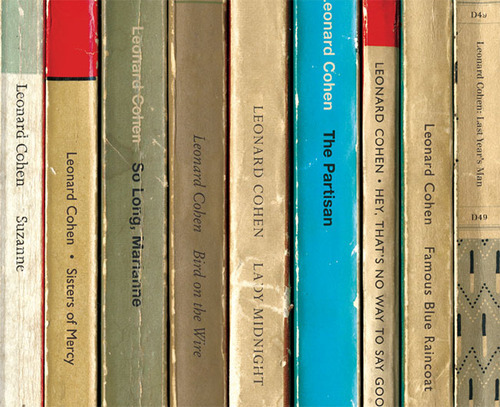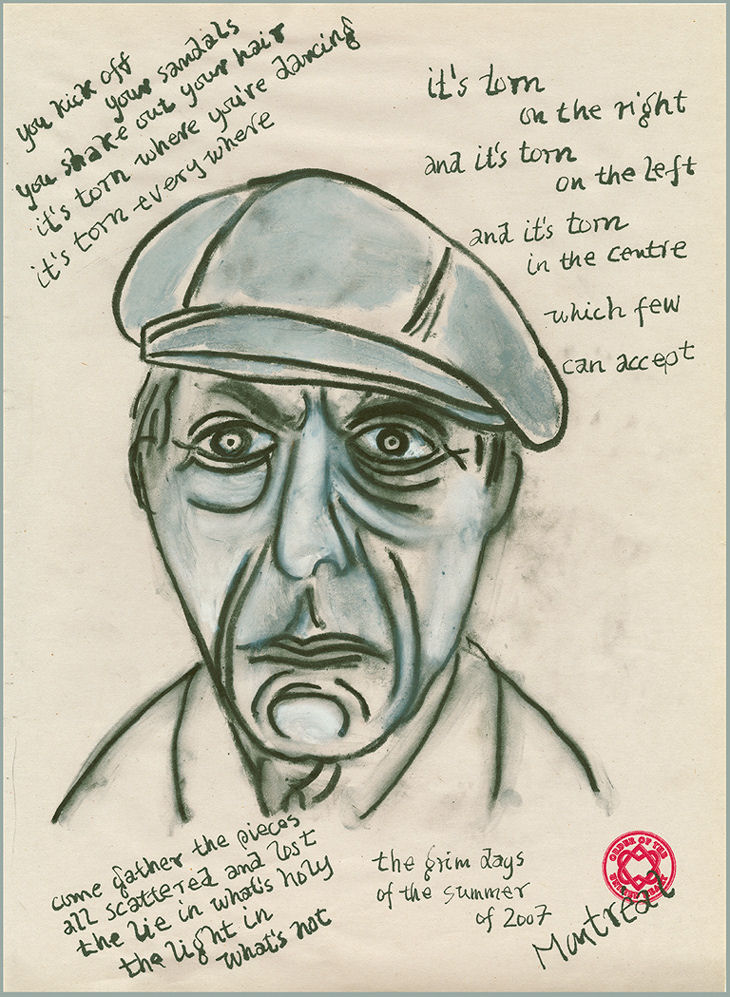Creation Myths
In the beginning—in our first session, that is—there were Bob Dylan and Leonard Cohen. But where do they come from and what are they for?

Both have crafted personal myths describing unusual origins and a unique calling echoing mythic heroes of old, and because they are both the tellers and the heroes of their own tales, each plays a double role—Homer and Odysseus at the very same time. This is just one of the many post-modern twists Dylan and Cohen bring to the ancient art of mythmaking.
From the start Dylan is a fiercely independent wanderer. He accepts a calling "to make shoes for everyone, even you/but still I walk barefoot" in "I and I" (which appears below). Even moments of grace like the midnight strolls in "I and I" or the "mystic garden" of "Ain't Talkin'" (which will appear a few sessions later), Dylan does his seeking alone.
Leonard Cohen is also a serial seeker, but particularly in the later portion of his career, he positions his purpose differently than Dylan. Cohen dwells in a kind of humility or simplicity of service that Dylan blends into more complex, challenging narratives. Hear how Cohen draws upon the image of a servant in "Show Me the Place," accepting that he is a vessel for a higher purpose. He calls out for resolution for ancient spiritual conundrums of suffering—"when the Word became a man" or how to move a mythic Sisyphean stone—and asks for a partner from other realms to understand the universe, sing-saying in a low-pitched, pleading purr: "I can't move this thing alone."
Leonard Cohen is also a serial seeker, but particularly in the later portion of his career, he positions his purpose differently than Dylan. Cohen dwells in a kind of humility or simplicity of service that Dylan blends into more complex, challenging narratives. Hear how Cohen draws upon the image of a servant in "Show Me the Place," accepting that he is a vessel for a higher purpose. He calls out for resolution for ancient spiritual conundrums of suffering—"when the Word became a man" or how to move a mythic Sisyphean stone—and asks for a partner from other realms to understand the universe, sing-saying in a low-pitched, pleading purr: "I can't move this thing alone."
 Dylan makes no bones about knowing that he and everyone must serve a greater power:
Dylan makes no bones about knowing that he and everyone must serve a greater power:You may call me Terry, you may call me Timmy
You may call me Bobby, you may call me Zimmy
You may call me R.J., you may call me Ray
You may call me anything but no matter what you say
You may call me R.J., you may call me Ray
You may call me anything but no matter what you say
You’re gonna have to serve somebody, yes indeed
You’re gonna have to serve somebody
Well, it may be the devil or it may be the Lord
But you’re gonna have to serve somebody
His narrators often speak of being vessels of higher purpose, but they are "still on the road lookin' for another joint." Even the heavenly forces his narrators know well cannot pin Dylan's heroes down. Always on the move, Dylan does not want or need a partner to help him. Cohen longs for a partner, and when he finds one, he holds on to him or her tight.You’re gonna have to serve somebody
Well, it may be the devil or it may be the Lord
But you’re gonna have to serve somebody
Masters and Teachers
Relationships to teachers reflect this same difference in approach. For Dylan, even if his high school yearbook lists his life ambition as being to "follow Little Richard," the master teacher of the first portion of his career is Woody Guthrie.
"Last Thoughts on Woody Guthrie," written and performed in 1963, is classic ode of a young man to his teacher. It ends like this:
And where do you look for this hope that yer seekin'
Where do you look for this lamp that's a-burnin'
Where do you look for this oil well gushin'
Where do you look for this candle that's glowin'
Where do you look for this hope that you know is there
And out there somewhere
And your feet can only walk down two kinds of roads
Your eyes can only look through two kinds of windows
Your nose can only smell two kinds of hallways
You can touch and twist
And turn two kinds of doorknobs
You can either go to the church of your choice
Or you can go to Brooklyn State Hospital
You'll find God in the church of your choice
You'll find Woody Guthrie in Brooklyn State Hospital
Where do you look for this lamp that's a-burnin'
Where do you look for this oil well gushin'
Where do you look for this candle that's glowin'
Where do you look for this hope that you know is there
And out there somewhere
And your feet can only walk down two kinds of roads
Your eyes can only look through two kinds of windows
Your nose can only smell two kinds of hallways
You can touch and twist
And turn two kinds of doorknobs
You can either go to the church of your choice
Or you can go to Brooklyn State Hospital
You'll find God in the church of your choice
You'll find Woody Guthrie in Brooklyn State Hospital
And though it's only my opinion
I may be right or wrong
You'll find them both
In the Grand Canyon
At sundownI may be right or wrong
You'll find them both
In the Grand Canyon
After Guthrie—but for a very public commitment to being "Property of Jesus" in the 70's—Dylan never commits to another single teacher or path in the overall arc of his songs. He learns from everyone and no one, singing: "Don't follow leaders/Watch the parking meters." Recently, the Never Ending Bootleg Series revealed a tune—"Working on a Guru"—that pokes fun at the foolish move to become beholden to a single master:
Rain on the ground, windshield wipers movin',
Water all around, I sure don't feel like groovin'.
I'm working on a guru,
Yes, I'm working on a guru,
But I'm working on a guru, before the sun goes down.
Working on a guru,
Working on a guru,
Well, it's true, it could be you ...
I'm working on a guru
In some ways, Dylan's most poignant expression of being a following is his resigned acceptance of fate, that he is a cog in the great wheel of life, as in "Every Grain of Sand":
I hear the ancient footsteps
like the motion of the sea
Sometimes I turn, there’s someone there,
Sometimes I turn, there’s someone there,
other times it’s only me
I am hanging in the balance
of the reality of man
Like every sparrow falling,
Like every sparrow falling,
like every grain of sand
In the lyrical flow of a psalm, Dylan's ultimate teacher is a sense and spirit of creation itself.
Leonard Cohen seeks real people of every kind to be his teachers, a litany of poets, lovers, scholars, musicians, and spiritual masters that he cites at every stage of his career:
I knew the words of every song.
Did my singing please you?
No, the words you sang were wrong.
Who is it whom I address,
who takes down what I confess?
Are you the teachers of my heart?
We teach old hearts to rest.
Oh teachers are my lessons done?
I cannot do another one.
They laughed and laughed and said, Well child,
are your lessons done?
are your lessons done?
are your lessons done?
"Master Song" plays with this motif as part of a romantic tangle, indicating how thick master/disciple themes are in Cohen's mythic imagination.
Book of Longing (2006), collection of poetry and drawings, is full of gestures of love and admiration for teachers, particularly for Roshi, Cohen's master of several decades, including a period living as monk at a Zen monastery on Mount Baldy outside of Los Angeles.
HIS MASTER’S VOICE
After listening to Mozart
(which I often did)
I would always
Carry a piano
Up and down
Mt. Baldy
And I don’t mean
A keyboard
I mean a full-sized
Grand piano
Made of cement
Now that I am dying
I don’t regret
A single step

ROSHI
I never really understood
what he said
but every now and then
I find myself
barking with the dog
or bending with the irises
or helping out
In other little ways
ROSHI AT 89
Roshi’s very tired
he’s been lying on his bed
He’s been living with the living
and dying with the dead
But now he wants another drink
(will wonders never cease?)
He’s making war on war
And he’s making war on peace
He’s sitting in the throne-room
on his Original Face
and he’s making war on Nothing
that has Something in its place
His stomach’s very happy
The prunes are working well
There’s no one going to Heaven
And there’s no one left in Hell
And as has he had done since his first brush with fame as an upstart Canadian poet in the 50's and 60's, Cohen calls out the fellow writers who helped shape his own voice:
LAYTON’S QUESTION
Always after I tell him
what I intend to do next,
Layton solemnly inquires:
Leonard, are you sure
you’re doing the wrong thing?
 LORCA LIVES
LORCA LIVESLorca lives in New York City
He never went back to Spain
He went to Cuba for a while
But he’s back in town again
He’s tired of the gypsies
And he’s tired of the sea
He hates to play his old guitar
It only has one key
He heard that he was shot and killed
He never was, you know
He lives in New York City
He doesn’t like it though
Cohen and Dylan both express awe, humility, longing, and praise as they try to make their way towards wisdom on a twisting mythic path. Dylan, launched into public consciousness as a hipster reimagining of Woody Guthrie, avoids aligning the heroes of his music with any one figure or school of thought. It's also worth noting that even though most of his songs as written in the first person, Dylan often denies in interviews that his work is auto-biographical. Maybe it is and maybe it is not. The point is that Dylan's work is a sophisticated mix of mythic commentary and confession. Cohen unabashedly grounds himself in people and disciplines that define his path and shares his journey lucidly and unadorned.
Next Up: Dreams and Visions
In the joint mode of mythic seekers and bards of themselves, Dylan and Cohen describe unique origins and purpose and wrestle with who and what serve as their guides for their purposes. Tomorrow we will see how each fleshes out their calling with dreams and visions of life, the universe, and everything.
Read about Dreams and Visions here.
No comments:
Post a Comment